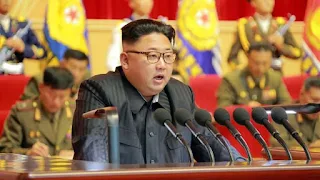Trump holds first face-to-face talks with Pope Francis
US President Donald Trump has met Pope Francis for a short private audience on the third leg of his overseas trip.
The Vatican said after the meeting that there had been an "exchange of views" on several unspecified international issues, and spoke of the need to continue good bilateral relations.
The two men have already clashed at a distance on issues including migration and climate change.
Mr Trump is also meeting Italy's president and prime minister.
Later, he will fly to Brussels for a Nato summit.
He earlier vowed to help Israelis and Palestinians achieve peace, as he ended the Middle East leg of his tour.
The US leader began his foreign trip with a two-day stop in Saudi Arabia over the weekend, urging Muslim countries to take the lead in combating radicalisation.
- Weird moments from Trump's trip
- Is 'thumbs up' actually controversial?
- Trump trip: Symbols but no substance
Much-anticipated meeting
Mr Trump and his entourage arrived at the Vatican just before 08:30, in a the meeting that was arranged at the last minute.
The US president was greeted by Archbishop Georg Ganswein, the head of the papal household, and escorted by the Swiss Guard to the offices of Pope Francis
.
Correspondents say their initial greeting was cordial. Mr Trump told the Pope "it is a great honour".
The two men spoke privately for about 20 minutes. The Vatican said later that they shared a commitment to "life, and freedom of worship and conscience" and expressed hope that they can collaborate "in service to the people in the fields of healthcare, education and assistance to migrants".
On international affairs, their "exchange of vie
After the meeting, they exchanged gifts. Mr Trump gave the Pope a boxed set of writings by the civil rights leader Martin Luther King.
The Pope gave Mr Trump a signed copy of a message he delivered for World Peace Day, along with some of his writings about the need to protect the environment. "Well, I'll be reading them," Mr Trump told him.
Seeking common ground - analysis by the BBC's Jon Sopel, Rome
Ever so slowly and flanked by the Swiss Guard the leader of the world's pre-eminent superpower walked through the Vatican to meet the leader of one of the world's pre-eminent religions.
And were there ever two more different people? Pope Francis with just the merest hint of a smile; President Trump beaming. They sat across from each other in the pontiff's study as though one was going for a job interview.
During the election campaign, when Pope Francis visited the US-Mexico border he said that people who choose to build walls and not bridges weren't Christian. Donald Trump said those comments were disgraceful.
And in February, just after Donald Trump had tried to introduce his travel ban from six mainly Muslim countries and suspended the refugee programme, the Pope tweeted: "How often in the Bible the Lord asks us to welcome migrants and foreigners, reminding us that we too are foreigners!"
The normal mantra when two world leaders meet is to say "there is more that unites us than divides us". Almost certainly true. But there are real differences as well.
And the entourage?
Mr Trump was joined not only by his wife, daughter and son-in-law but also Secretary of State Rex Tillerson and National Security Adviser HR McMaster.
Both Melania and Ivanka Trump were dressed in black with their heads partially covered, in keeping with a traditional Vatican protocol that is no longer expected to be rigorously observed.
Melania, a Catholic, asked the Pope to bless her rosary beads.
In a light-hearted exchange, Pope Francis asked her what she gave her husband to eat. It was initially thought he had suggested "pizza" to her, but in fact he said potica, which is a cake from Mrs Trump's home country of Slovenia. She laughed in response, and agreed with him.
What next for Mr Trump's trip?
Mr Trump followed his visit to the Vatican with talks with Italian President Sergio Mattarella at the Presidential Palace and Prime Minister Paolo Gentiloni at the US ambassador's residence.
This is Mr Trump's first visit to Europe since taking office in January.
Security has been stepped up across Rome, with the areas around the Vatican City, the Italian presidential palace and the American ambassador's residence, where Mr Trump is staying, temporarily closed to traffic.
Despite the heavy police presence, about 100 anti-Trump protesters held a rally in one of Rome's squares on Tuesday evening.
Later on Wednesday, Mr Trump will fly to Brussels, where significant protests are expected.
For the EU and for Nato, this visit is about damage limitation with the fervent hope of establishing some kind of transatlantic chemistry, the BBC's Europe editor Katya Adler says.
She adds that the tone in Brussels has gone from off-the-record sneering when the erratic and unpredictable Mr Trump first won the November elections, to outright concern now that the implications of his presidency have begun to sink in.
BBC
















